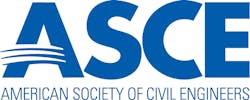RESTON, Va. – The American Society of Civil Engineers (ASCE) announced its 2020 class of Distinguished Members today, awarding eight distinguished and active members with the highest honor ASCE can bestow. Out of ASCE’s nearly 150,000 active members, only 223 hold the status of Distinguished Member. This honor is reserved for those who have attained eminence within the realm of engineering, whether that be construction, related arts and sciences or engineering education. ASCE inducts a new class of Distinguished Members annually.
“We are proud to present the 2020 class of Distinguished Members, who represent the best of our profession and are well-deserving of the recognition for moving the profession forward,” said ASCE President K.N. Gunalan “Guna”, Ph.D., P.E. “These recipients have achieved a level of excellence that sets the standard for their peers while making marked contributions to the civil engineering profession.”
The 2020 class of Distinguished Members is as follows:
- Lorne G. Everett, Ph.D., D.Sc, Hon.D.WRE, Dist.M.ASCE, is one of only a small group of individuals that could be considered an expert in groundwater monitoring, characterization and remediation technologies. He has served as an expert witness in contaminant hydrology and hydrogeology. As the CEO and chief scientist of L. Everett & Associates LLC, Everett’s technologies have enhanced the understanding of hydrogeology. Everett has also testified before Congress on numerous occasions and was an invited member on 16 “Blue Ribbon” Department of Energy peer-review panels.
- G. Edward (“Edd”) Gibson Jr., Ph.D., P.E., Dist.M.ASCE, NAC, is a renowned expert in front-end planning of capital facilities in academia. Gibson’s various publications, educational offerings, and decision-support tools have saved the entire construction industry billions in costs. Gibson is a professor and the Sunstate Chair of Construction Management and Engineering at the Arizona State University School of Sustainable Engineering and the Built Environment.
- Vaughan Griffiths, Ph.D., D.Sc., D.GE, P.E., C.Eng., Dist.M.ASCE, is widely regarded as a true expert in the fields of risk assessment and finite element modeling. His contributions have increased safety and economic practices for geotechnical engineering projects. He has also served in several leadership roles at ASCE, including Colorado Section president and Board of Direction regional director. Griffiths is a professor of civil engineering in the Department of Civil and Environmental Engineering at the Colorado School of Mines.
- James R. Harris, Ph.D., P.E., F.SEI, Dist.M.ASCE, NAE, is a leader in structural engineering and known as an expert in the functionality and design of structures— from dwellings and high-rise buildings to industrial facilities, excavation bracing, buildings in the highest seismic zones, renovations of historic buildings and many others that are prone to experiencing extreme events. He has designed or evaluated thousands of structures and has focused on improving the creation and use of engineering standards. Harris has been a leading supporter of the move toward limit state design and uniform reliability-based loading requirements of all structural standards in the United States. Harris is past chair of the ASCE/Structural Engineering Institute Standards 7 Committee. He is currently president of J.R. Harris & Co., an engineering services company.
- Ron Klemencic, P.E., F.SEI, Dist.M.ASCE, NAC, NAE, is one of the most prominent structural engineers of high-rise buildings in the world. Klemencic has overseen the construction of over 200 buildings at least 27 stories high across 20 countries, including 150 North Riverside in Chicago, one of ASCE’s 2019 Outstanding Civil Engineering Achievement award winners. He is also known for leading the advancement of performance-based wind design. A registered professional engineer in 16 states, Klemencic is chairman and CEO of Magnusson Klemencic Associates, has been director of the Charles Pankow Foundation for more than 10 years and has made major contributions to the cause of construction and structural research.
- Steven L. Kramer, Ph.D., Dist.M.ASCE, NAE, is a professor at the University of Washington, whose research on geotechnical earthquake engineering has led to advancements in the understanding of liquefaction, seismic slope stability and performance-based earthquake engineering. As a consultant on major projects, he led investigations that revealed the seismic vulnerability of the Alaskan Way Viaduct in Seattle, and its adjacent seawall, of which the investigation helped lead to the eventual reconstruction of Seattle Seawall and construction of a waterfront tunnel to replace the viaduct in 2019. More recently, he served as a neutral expert for the team mediating settlement-related litigation for the Millennium Tower in San Francisco and as an international consultant to an independent committee examining the causes and responsibilities for the 2019 failure of the Corrego de Feijao tailings dam in Brumadinho, Brazil.
- Ronald K. (“Kerry”) Rowe, Ph.D., P.Eng., Dist.M.ASCE, NAE, is internationally recognized for his leadership in the geoenvironmental and geosynthetics engineering fields. Rowe’s work has examined contaminant migration, containing contaminants, failures of slopes and excavations, and more. Kerry is editor in chief of both the Geotextiles and Geomembranes Journal and the Royal Society Open Science (Engineering) Journal and serves as an associate editor and on the editorial boards of many other publications. He has consulted on engineering projects from the Arctic to Antarctica and in many countries around the world. Rowe has been a Canada Research Chair in Geotechnical and Geoenvironmental Engineering in the Department of Civil Engineering at Queen’s University, where he is also the Barrington Batchelor Distinguished Professor. He is also the past president of the International Geosynthetics Society.
- Richard M. Vogel, Ph.D., Dist.M.ASCE, is a hydrologist and professor emeritus in the Department of Civil and Environmental Engineering at Tufts University. Having made significant contributions to stochastic hydrology, Vogel’s work has opened doors to hydrologic risk and reliability concepts and has advanced watershed modeling and management principles. Additionally, he and his group were the first to define hazard function analysis in flooding analysis, which has been extended to and routinely applied in medicine, earthquakes and many other fields.
For more information on ASCE Distinguished Members and criteria, go to www.asce.org/distinguished_members.



